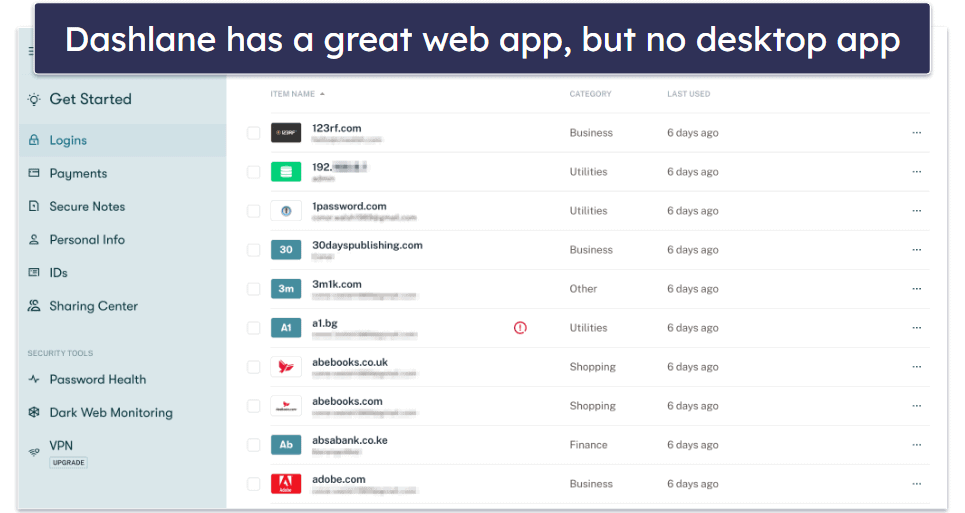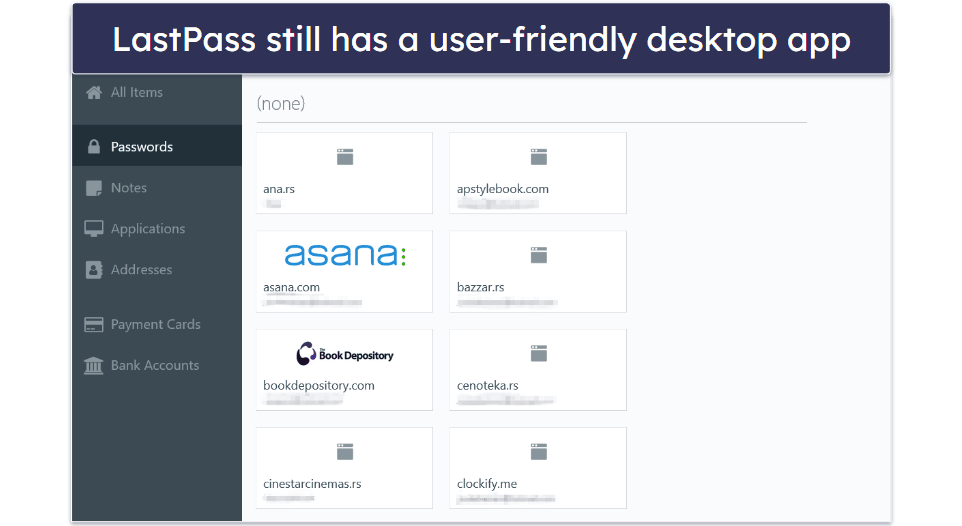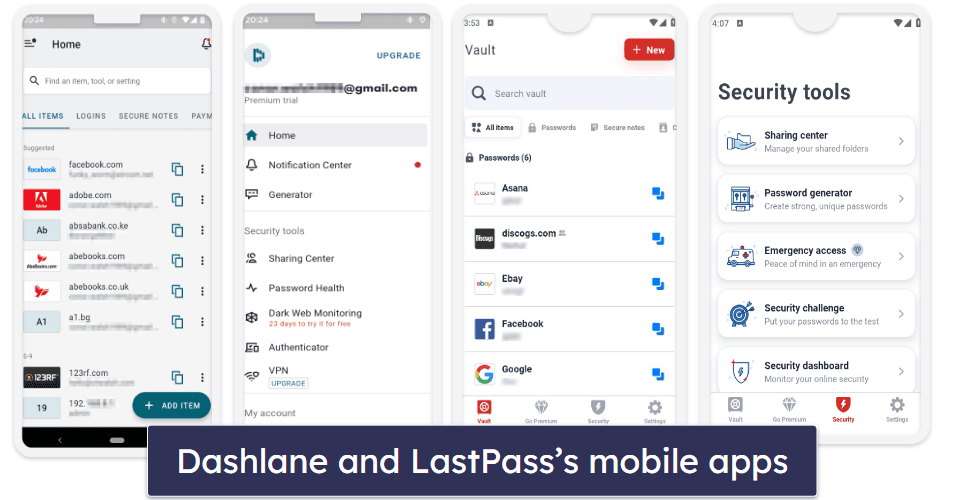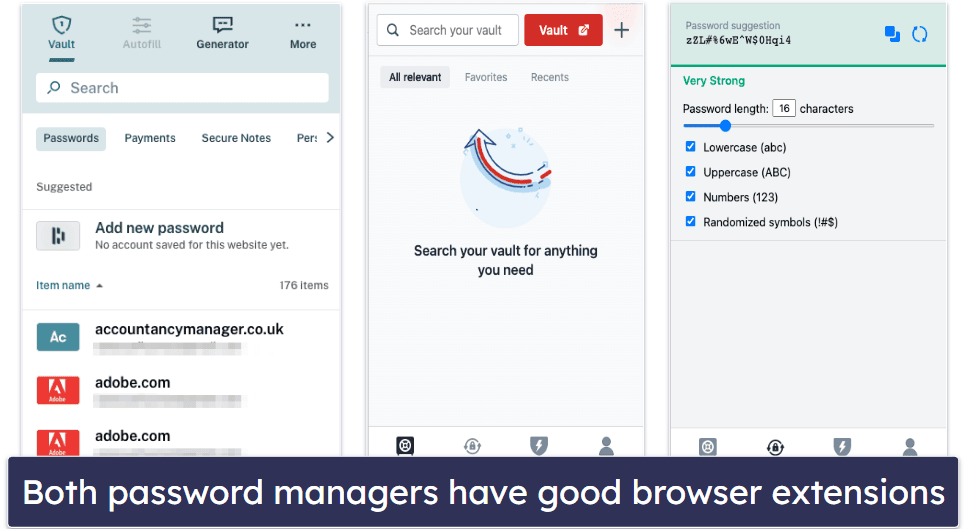
Updated on: February 28, 2024
Short on Time? Here’s the Final Verdict:
- 🥇 Dashlane — Winner in Security & Data Privacy, Advanced Features, Plans & Pricing, and Customer Support. Dashlane has high-security practices, live dark web monitoring, unlimited password sharing, and a surprisingly good VPN. It’s great value, and it comes with a 30-day free trial and a 30-day money-back guarantee.
Out of 50+ password managers, Dashlane and LastPass consistently rank in the top 5 on our top 10 list. Both are secure, easy to use, and include an impressive range of features — you can’t go wrong with either one.
Both have all the features I expect to see in a premium password manager in 2024, including 256-bit AES encryption, password generation, auto-save and auto-fill, and two-factor authentication (2FA). They also both offer secure password sharing and intuitive mobile apps.
However, Dashlane and LastPass differ in some key areas. Dashlane offers more high-security tools, including the most advanced dark web monitoring available with a password manager and anti-phishing protection. It’s also the only password manager to provide a virtual private network (VPN), and it’s recently started supporting passkeys, a cutting-edge new tech that could replace passwords altogether.
On the other hand, LastPass offers a comprehensive range of account recovery options, is slightly better at auto-filling web forms, is a bit easier to use, and provides more helpful in-app tutorials.
I decided to do a full comparison of Dashlane and LastPass, testing each one’s password management features, additional tools, ease of use, plans, pricing, and customer support. After weeks of testing, researching, and comparing, I settled on a winner — in my opinion, Dashlane is better than LastPass in many ways. But it was a tough decision, as LastPass is also an excellent product, and it may be a better fit for some users.
Dashlane vs. LastPass — Quick Overview
Security & Data Privacy — Dashlane Has Never Been Hacked
Both Dashlane and LastPass are exceptionally secure password managers that offer robust security features, such as 256-bit AES encryption (all of your data is encrypted on the device level with military-grade encryption), zero-knowledge protocol (neither Dashlane’s nor LastPass’s staff can access your password vault), and multi-factor authentication (MFA).
Dashlane provides a good range of 2FA options: authenticator apps (mobile-based apps, like Google Authenticator, Authy, etc.), backup codes (you can use these codes to access your password vault in case you lose the device with the authenticator app installed), and biometric scanning. All of Dashlane’s 2FA options work really well, but I’m a bit disappointed that the company no longer offers USB security keys (it used to offer U2F support prior to switching to a web-based app). That said, it’s good that Dashlane has introduced an account recovery key option, ensuring users can regain access to their vault if they lose their master password.
LastPass has more 2FA options, including: authenticator apps (LastPass MFA, Google Authenticator, Microsoft Authenticator, Duo Security, Toopher), printable spreadsheets (Grid), and support for USB security keys (YubiKey), fingerprint sensors, and smart card readers.
Unfortunately, LastPass has suffered from a few data breaches in the past. The latest incidents happened in the second half of 2022, when a software engineer’s corporate laptop was hacked, giving malicious actors access to LastPass’s cloud-based development environment and source code. The threat actors used the information stolen in this first incident to identify targets and initiate the second incident, in which they managed to gain access to cloud-based backup storage, including backups of all customer vault data. But due to LastPass’s zero-knowledge architecture, no user passwords were stolen in the data breach (the hackers only stole encrypted and therefore unreadable data).
Winner (Security & Data Privacy): Dashlane
Dashlane has never been hacked, while LastPass has had several security issues over the years, most recently in October 2022 (although no user passwords were leaked). So LastPass’s past security vulnerabilities give Dashlane the competitive edge, although the two password managers provide nearly identical security features — including end-to-end encryption and zero-knowledge architecture. Both also offer a wide range of 2FA options, but Dashlane no longer offers support for USB authentication.
Basic Features — LastPass’s Password Generator Is Slightly Better
Both Dashlane and LastPass are excellent at basic password management. They both work with the most popular operating systems and browsers, and they both have essential features such as unlimited password storage, multi-device synchronization, and secure notes.
During my tests, Dashlane’s auto-save and auto-fill features worked great. Every time I created a new login, Dashlane would automatically ask to save my credentials. And whenever I navigated to a login field, Dashlane automatically logged me into my account. You can choose login credentials to auto-fill either automatically or with a single click on the Dashlane icon in the login field.
Likewise, I was pretty impressed with LastPass’s auto-save and auto-fill functions. In my tests, LastPass asked if I wanted to save account details every time I made a new account, and it automatically filled in my credentials whenever I wanted to log into an account. LastPass was even able to auto-fill my details on pages with separate windows for usernames and passwords, which Dashlane occasionally failed to do.
Dashlane’s password generator is pretty basic, but it works well. You can create a password between 4 and 40 characters, including numbers, letters, symbols, and similar characters (for example, Z and 2). Unfortunately, Dashlane doesn’t generate passphrases, which are easier to remember and, according to some experts, more secure than passwords.
LastPass’s password generator is a bit better than Dashlane’s — in addition to creating passwords with letters (both uppercase and lowercase), numbers, and symbols, LastPass lets you generate passwords that are “easy to say” (without special characters) and “easy to read” (without characters that are hard to read, like “I, l, O and 0”). LastPass’s passwords are up to 99 characters long (or 128 characters on the Android app), which is longer than Dashlane’s 40-character upper limit. But just like Dashlane, LastPass lacks a passphrase generator.
Winner (Basic Features): LastPass
I found LastPass to be a bit better for auto-filling logins and web forms, and its password generator can create longer passwords. That said, it was really difficult to pick a winner for this round because both password managers provide excellent functionality — importing passwords, generating new passwords, auto-saving logins, and auto-filling saved information is very simple with both products.
Advanced Features — Dashlane’s Extras Are More Valuable
Dashlane and LastPass have a lot of extras in common, but each also offers some unique ones. For example, LastPass has credit monitoring (US only) and country restrictions. Dashlane, on the other hand, offers a VPN, passkeys as an alternative to passwords, and real-time dark web monitoring.
Both Dashlane and LastPass offer 1 GB of encrypted storage to paid users. Dashlane offers the same amount of storage to free users as well, but LastPass limits the free accounts to 50 MB. With Dashlane, the maximum file size for individual files is 50 MB, while LastPass is more restrictive, limiting individual file size to 10 MB.
Dashlane is the only password manager on the market that comes with a VPN. Its VPN is powered by Hotspot Shield, uses 256-bit AES encryption, comes with a kill switch (for Windows and Android) and a strict no-logs policy, and maintains fast speeds. While the VPN isn’t as feature-rich as the top standalone VPNs, it does have split-tunneling, it allows torrenting, and it works with top streaming services like Netflix.
Passkeys are another advanced feature that makes Dashlane really stand out from the crowd. Designed to entirely replace passwords in the future, passkeys are used to encrypt and decrypt your data on your device before it’s uploaded to Dashlane’s servers, ensuring that the data is only accessible to you with the correct passkey. Passkeys free you from the responsibility of choosing a strong password for each account — they’re automatically generated by Dashlane to be unique and exceptionally secure. With passkeys, you don’t have to worry about falling prey to phishing attempts either, because your passkeys will only work on the site they were created for.
Dashlane also has the best dark web monitoring on the market. It uses live agents with access to hacking forums and sites on the dark web. If any of your information gets leaked, they personally notify you and quickly work with you to protect your data and identity.
Finally, Dashlane’s anti-phishing feature ensures users are always on the genuine site by verifying the website’s URL before auto-filling credentials. Additionally, Dashlane sends real-time alerts if users accidentally land on a suspicious website and try to fill their credentials there.
LastPass also provides data breach alerts through its partnership with Enzoic (a human and AI-powered agency that scans the internet, dark web, and torrenting services for compromised data). If any of your credentials have been leaked, LastPass will notify you through the Security Dashboard and tell you what information was breached.
I really like LastPass’s country restrictions. When you create an account on LastPass, you can lock it to the country you registered the account in. This extra layer of security can prevent hackers from other countries from getting into your account. However, if you plan to travel internationally or use a VPN, you can set up a list of trusted countries from which you’ll be allowed to log into LastPass.
If you live in the US, LastPass also has a free credit monitoring service through TransUnion (for premium users only). If your credit report unexpectedly changes, LastPass notifies you via text or email. LastPass also allows you to upgrade to premium credit monitoring for a small monthly fee, giving you access to credit reports from all three major credit bureaus. LastPass will show you exactly what changes happened, when and where they happened, and which bureau(s) reported them.
Winner (Extra Features): Dashlane
Dashlane’s advanced dark web monitoring and VPN are some of the most valuable extra features on the password manager market. Dashlane is also the first password manager to introduce passkeys, an exciting new technology with the potential to completely replace passwords. That said, I like LastPass’s country restrictions, and its credit monitoring tool is a great benefit for US users.
Apps & Browser Extensions — LastPass Offers a Desktop App

Starting from January 2022, Dashlane stopped offering a dedicated desktop app for its password manager and instead became a web-only platform, meaning that you can only access it through a web browser. While the web apps are easy to use and lightweight, this also means that offline access to your data is more complicated.

LastPass, on the other hand, still provides desktop apps for Windows, Mac, and Linux. The apps are well-designed and intuitive, and provide seamless offline access to your vault.

LastPass’s iOS and Android apps are a bit different from the web vault, but still very easy to use. The app makes auto-filling across mobile sites a breeze. The password generator is also available (under the Security tab), as is the Sharing Center, but the latter can only be used by Families, Teams, and Business users.

Both Dashlane and LastPass offer extensions for Chrome, Firefox, Edge, Safari, and Opera. In addition to that, Dashlane also supports Brave. The extensions are pretty similar, both give you access to the same features and work without any glitches. LastPass also offers a universal Windows installer that will install the LastPass extension on all your browsers, which is pretty convenient.
Winner (Apps & Browser Extensions): LastPass
LastPass comes out on top because it continues to provide desktop apps that offer seamless offline access to user data. I also like that LastPass offers a universal Windows installer for its browser extension.
Ease of Use & Setup — LastPass’s One-Click Import Option Is a Time-Saver
Both Dashlane and LastPass are very intuitive, but LastPass makes it a bit easier to import passwords from other password managers and browsers, plus it has super helpful built-in tutorials. That said, I think both new and advanced users will find it easy to use both password managers.
Dashlane is really user-friendly despite offering a ton of extra security features. It has a clean, uncluttered interface that makes it easy to find everything you need.
My only complaint with Dashlane is that importing passwords isn’t as easy as with LastPass. To import passwords into Dashlane, you need to first download them as a CSV file, whereas LastPass has a one-click import option from both other password managers and browsers. (That said, try not to import more than 200 passwords to LastPass at once, as you may encounter import issues.)
LastPass provides concise, clear instructions on how to use the app and all of its features. However, even if you ignore the built-in tutorials, LastPass’s user interface is still really simple to navigate. This intuitiveness makes LastPass one of the best password managers for beginners, non-tech-savvy users, or families — no matter your age or skill level, you’ll be able to locate and use most of LastPass’s features without any difficulties.
Winner (Ease of Use): LastPass
LastPass wins this round because it’s a bit easier to use — it offers convenient in-app tutorials to explain every single feature in case you’re confused and has one-click password importing, unlike Dashlane, which only supports CSV importing.
Plans & Pricing — Dashlane’s Premium Plan Provides the Most Value
Dashlane and LastPass both provide good (but limited) free plans and a 30-day free trial of their premium versions. Dashlane’s plans are backed by a risk-free 30-day money-back guarantee, whereas LastPass doesn’t provide a money-back guarantee.
Dashlane Free gives you 25 passwords and 1 GB of encrypted storage. It also comes with the password generator, form and payment auto-fill, 2FA, password sharing with an unlimited number of Dashlane users, security alerts, password vault auditing, basic anti-phishing protection, and a 30-day free trial of Premium. However, it limits you to just 1 device.
LastPass Free is a decent free plan with unlimited passwords and 50 MB of encrypted storage. It also includes the password generator, form and payment auto-fill, 2FA compatibility with authenticator apps, one-to-one password sharing, a TOTP generator, and data breach alerts. However, you’ll only be able to use it on 1 device type (desktop or mobile).
Dashlane offers an individual premium plan, Dashlane Premium, as well as a Friends & Family plan, and 2 business plans (Starter and Business). Dashlane Premium ($4.99 / month) has all the same features as Dashlane Free, along with unlimited passwords, multi-device synchronization, dark web monitoring, and a VPN (provided by Hotspot Shield).
LastPass has 1 premium plan for individual use (Premium), 1 family plan (Families), and 2 business plans (Teams and Business). LastPass Premium ($3.00 / month) has all of the features included in the free plan, but it also provides 1 GB of encrypted storage, one-to-many sharing, 2FA with USB tokens, use on unlimited devices, emergency access, and credit monitoring (US only). You can try out LastPass Premium with a 30-day free trial, but there’s no money-back guarantee.
Winner (Plans & Pricing): Dashlane
Overall, I think Dashlane offers better value: Its Premium plan includes a VPN, which isn’t offered by LastPass. The Dashlane Free plan also offers more encrypted storage than LastPass’s free plan, although you can only use it on 1 device. Finally, Dashlane’s personal plans come with a 30-day money-back guarantee, offering more security to users who may be hesitant to commit to a paid plan.
Customer Support — Dashlane’s Support Is More Accessible
Dashlane and LastPass provide similar customer support options, but I found it easier to access Dashlane’s support team. Dashlane doesn’t restrict its email support to business users like LastPass does, and its live chat is much better than LastPass’s. Both Dashlane and LastPass have comprehensive knowledge bases, where it’s easy to get your technical questions answered.
Dashlane has great live chat support, as well as email support, an extensive knowledge base, Twitter support, and an official Reddit page. Its live chat is available Monday to Friday from 9:00am to 6:00pm EST. After establishing a connection through an automated bot, I was able to connect with an agent in less than a minute — the support rep was friendly and professional, and they were able to answer all my questions. However, I was a bit disappointed with the email support — it took them more than two days to reply.
LastPass has a dedicated support portal that offers ticket (email and phone) support, live chat, an active community forum, and an extensive knowledge base with helpful video tutorials. During testing, I couldn’t get its live chat support working as it never had a representative available to speak with me. Instead, I had to submit a ticket and wait more than a day for an email response. Support was much faster via phone — when I selected the “Call Me” option in the support portal, I received a phone call from a helpful agent within 5 minutes.
I don’t like that LastPass’s customer support is very limited for users on the free plan, who only get access to the community forum and support articles. You’ll have to upgrade to a paid plan if you want live chat (if and when it works), email, or phone support. Dashlane offers priority support for premium users, but all its live chat and email support are available for free users, too.
Winner (Customer Support): Dashlane
Dashlane takes the edge here thanks to its responsive live chat. What’s more, it provides email support to all users, unlike LastPass, which restricts both email and phone support to paid users. Both password managers have comprehensive knowledge bases, but Dashlane’s accessibility to support channels for free users and its fully functional live chat give it an advantage over LastPass.
Overall Winner: Dashlane
Dashlane is a remarkably secure and feature-packed password manager offering a host of premium extras. It provides intuitive apps across various platforms, password auditing, sophisticated dark web monitoring, a VPN, alerts for anti-phishing, and limitless password sharing, thereby boosting the overall safety of user accounts. Moreover, Dashlane boasts a highly user-friendly interface, top-notch customer service (including live chat), the most competitive free plan available, cost-effective individual and family plans, and a 30-day money-back guarantee.
LastPass comes with a user-friendly interface and great extra security features, such as enhanced two-factor authentication, password vault auditing, secure password sharing, data breach alerts, and excellent account recovery options. It’s slightly easier to navigate than Dashlane, has decent customer service, a fairly solid free plan, and economically-priced premium plans. However, it lacks a money-back guarantee.
Dashlane leads the pack thanks to its superior features, top-notch customer service with live chat, and the richest free plan. Although LastPass brings compelling features and affordable plans to the table, it’s held back by less responsive customer service and the lack of a refund policy. Dashlane shows a greater commitment to customer satisfaction.
Frequently Asked Questions
Is Dashlane better than LastPass?
In my opinion, yes, Dashlane is better than LastPass. It’s got better security, more advanced features, better plans and pricing, and better customer support. That said, LastPass is still very good — it’s easier to use and it’s basic features are slightly better than Dashlane’s.
Does Dashlane have more security than LastPass?
Both Dashlane and LastPass have extremely good security. For example, both implement 256-bit AES encryption, 2FA, zero-knowledge architecture, and biometric scanning. That said, LastPass did suffer several data breaches in the past, but it’s important to know that no passwords or data were exposed. I ultimately chose Dashlane as the winner in Security & Data Privacy due to its spotless history, but LastPass will also keep your passwords, your identity, and your data safe (it’s still one of the most secure password managers on the market).
Why is Dashlane better than LastPass?
In my opinion, Dashlane is better than LastPass because it has never been hacked, it has unique advanced features such as dark web monitoring and VPN, a more generous free plan, and superior customer support, including live chat. These factors combine to make Dashlane a more comprehensive and user-friendly password manager, ensuring users have both an optimal experience and robust protection for their sensitive information.
Do Dashlane and LastPass have free plans?
Both Dashlane and LastPass have free plans, but both come with certain limitations. For example, Dashlane Free is limited to one device and LastPass Free forces you to choose between using it only on desktop or only on mobile devices. In my opinion, it’s better to choose a paid package instead of dealing with the hassles and limitations of a free password manager.